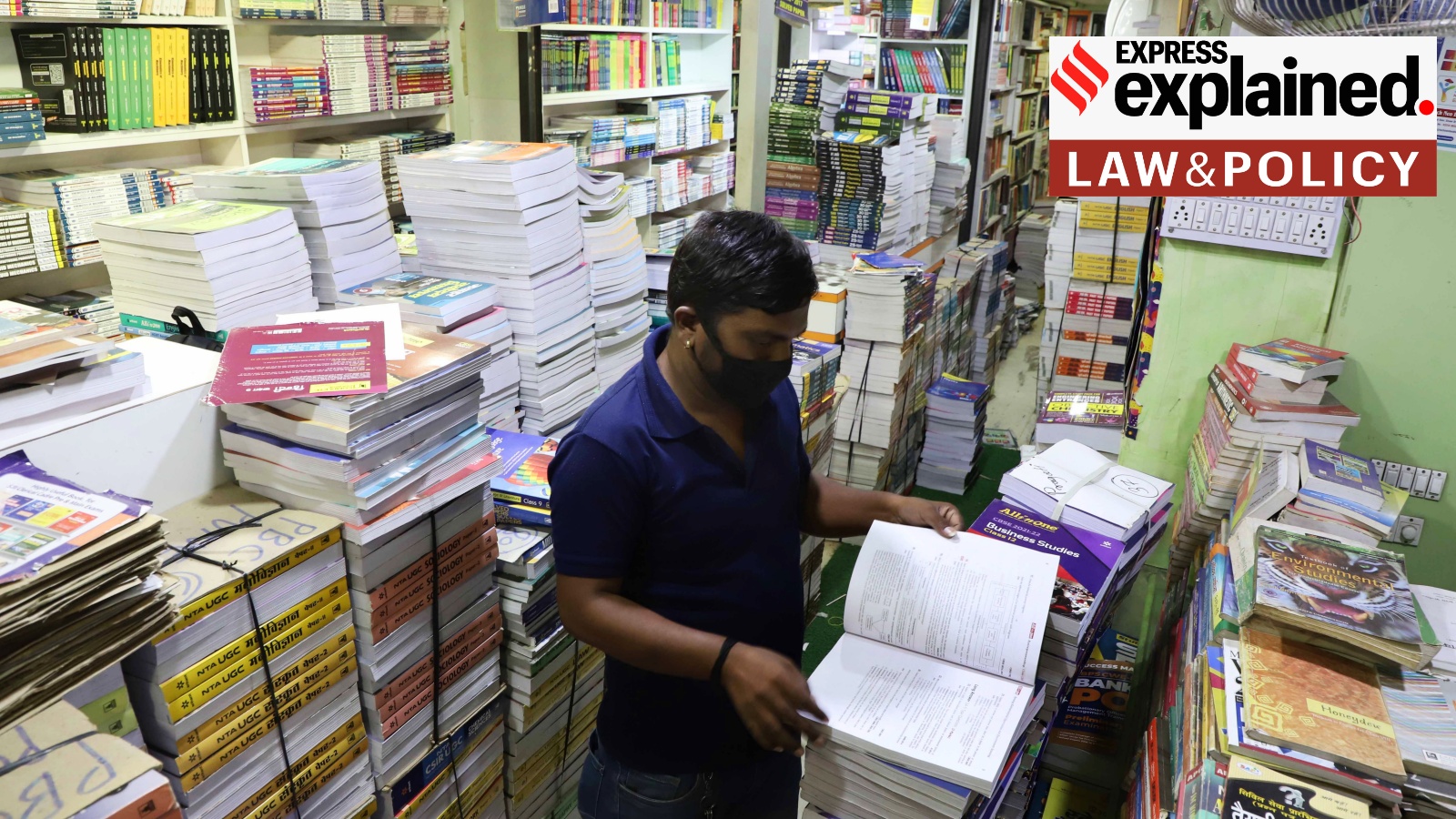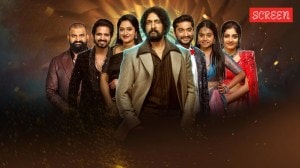Whether copyright can be claimed over maths and science textbooks: What Andhra Pradesh HC held
The court ruled in this case that under the fair use doctrine, even if the books printed by the publisher are assumed to be pirated copies, it would not mean copyright infringement. Here's why.
 Copyright refers to the right given by the law to creators of literary, dramatic, musical, and artistic works and producers of cinematograph films and sound recordings. (Express photo by Pavan Khengre)
Copyright refers to the right given by the law to creators of literary, dramatic, musical, and artistic works and producers of cinematograph films and sound recordings. (Express photo by Pavan Khengre)The Andhra Pradesh High Court ruled in a case in February that textbooks dealing with mathematical equations and science subjects do not come under copyright law, as their content is non-literary in nature.
Acting on a Guntur-based publishing house’s plea, a single-judge bench of Justice V Sujatha allowed the challenge to a 2010 government order that restricted private schools and colleges from publishing their own books.
The court also quashed a criminal case against the publishing house’s owner while directing the state government not to interfere with the “legitimate business activity” of publishing books.
What was the plea and the government order?
The AP HC was dealing with a petition filed by one Addala Sitamahalakshmi, owner of the Guntur-based Deepthi Publications. It publishes maths and science books for school students and books for engineering entrance examinations.
In her plea, Sitamahalakshmi sought to quash a 2010 AP government order, meant to restrict private schools and colleges from publishing their books to tackle “piracy.”
The order also directed all private colleges to purchase books prescribed by the CBSE and ICSE from Telugu Akademi, a government-controlled body under the Higher Education Department tasked with preparing and publishing books according to a government-approved syllabus.
Claiming that their books have exercises and objective questions to help students prepare for competitive exams, Deepthi Publications said they were based on the CBSE and ICSE syllabi.
Saying that the order should be declared illegal, arbitrary and unconstitutional, the petitioner asked the court to direct the AP government to not take further action against her based on the order. She also sought to quash a criminal case registered against her in 2011.
Why was the criminal case registered?
In April 2011, the publishing house was inspected without notice, their books and printing materials were seized, and their factory premises were sealed.
A case was also registered against Sitamahalakshmi under Sections 63 and 64 of the Copyright Act of 1957. Section 63 states that anyone “knowingly” infringing or abetting the infringement of copyright in a work is liable to be punished with six months to three years of imprisonment, along with a fine of 50,000 to 1 lakh rupees.
Meanwhile, Section 64 deals with the police’s power to seize infringing copies and allows any police officer “not below the rank of a sub-inspector” to seize without a warrant if satisfied that the offence under Section 63 has been committed.
What is copyright and when is it infringed?
Copyright refers to the right given by the law to creators of literary, dramatic, musical, and artistic works and producers of cinematograph films and sound recordings.
Essentially, it’s a bundle of rights that includes rights of reproduction, communication to the public, adaptation, and translation of a work. The 1957 Act aims to safeguard creative works considered to be a creator’s intellectual property.
A copyrighted work will be considered “infringed” only if a substantial part is made use of without authorisation. In cases of infringement, the copyright owner can take legal action and is entitled to remedies such as injunctions and damages.
What did the court decide?
The court ruled that the publisher’s actions fell under the fair use doctrine under Section 52. It added that even if the books printed by it are assumed to be pirated copies of Akademi’s books, their actions would fall under the exception under Sections 52 (1) (a) and 52 (1) (h) of the Act.
Broadly, Section 52 lists acts that don’t constitute infringement, even in cases where one has a copyright over the work. Section 52(1)(a) exempts “a fair dealing with any work” from being termed “infringement” if it’s for private or personal use, like research, criticism or review, or reporting of current events and affairs.
Similarly, Section 52(1)(h) exempts the publication of short passages from published literary or dramatic works in a collection intended for bona fide or genuine instructional use.
The court said the petitioner’s books are for the benefit of students and institutions, therefore they are protected under Section 52, which says fair use is an exception to copyright infringement in educational uses. Further, it said textbooks don’t fall under the copyright act.
The reason was that to qualify as a work in which a copyright can exist, it must be original. For example, an original literary, artistic, dramatic, or musical work. “The books in question printed by the petitioner are of non-literary in nature and hence, they would not fall within the ambit of Section 13 of the Copyright Act, 1957,” the court said.
However, the court stopped short of quashing the order, saying it was passed to protect the Akademi from piracy and “save the future of millions of students.” It also said that the order didn’t apply to the petitioner as it was intended for private “schools and colleges” rather than a publishing house.
Can there ever be a copyright on textbooks?
Earlier this month, the National Council of Educational Research and Training (NCERT), an advisory body to the government, issued a warning against copyright infringement of its educational materials.
It said in a press release that “unscrupulous publishers are printing NCERT school textbooks which are available on NCERT website, under their own name without obtaining permission from NCERT.” Anyone who publishes for commercial sale “NCERT textbooks in whole or in part or uses the NCERT textbook content in such publication, without obtaining the copyright permission from NCERT, shall be proceeded against in accordance with the Copyright Act 1957,” it said.
However, courts have sided with publishers in some cases.
In ‘Chancellor Masters & Scholars Of The University of Oxford vs. Narendra Publishing House’ (2008), Justice S. Ravindra Bhat of the Delhi HC dealt with a publishing house’s plea. It claimed their textbook, based on the syllabus prescribed by the J&K Board of Education for class 11, was being imitated in a book series published by one Narendra Publishing House.
Dismissing the claim, Justice Bhat said, “Mathematical questions are expressions of laws of nature. The discovery of such laws cannot confer monopoly to those who describe it. The reason is that language is a limited medium, which enables the description of such laws of nature – in only a few ways.”
In 2011, when this ruling was challenged before a bench of Justices AK Sikri and Suresh Kait, the court upheld the earlier decision, saying that though there is creativity attached to giving step-by-step solutions to questions, it is commonly known that math problems can be solved in different ways.
Additionally, the respondents showed that several questions from the appellant’s textbook were verbatim reproductions from other textbooks.
The court also referred to the Supreme Court’s 2008 ruling in ‘Eastern Book Company v. D.B. Modak’, where it held that work must be original in the sense that “by virtue of selection, co-ordination, or arrangement of pre-existing data contained in the work, a work somewhat different in character is produced by the author” rather than a verbatim reproduction.
- 01
- 02
- 03
- 04
- 05





































